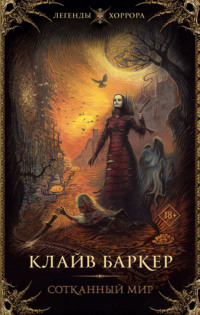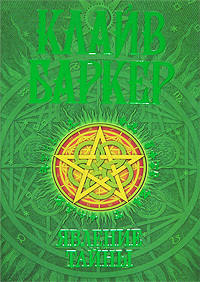
Полная версия
Abarat
“I heard your dad lost his job at the chicken factory. Had a little problem with the beer, so I was told?” Candy didn’t have time to agree or deny this. “You know what? I think that sometimes people should be given second chances. If you don’t give people second chances, how are they ever going to change?”
“I don’t know,” Candy said, feeling uncomfortable.
“Men.” Norma said, “You stay away from them, darlin’. They are more trouble than they’re worth. I’m on my third marriage, and I don’t give that more than two months.”
“Oh—”
“Anyway, you didn’t come over here to listen to me chattering on. So how can I help you?”
“I’ve got this project to do, about Chickentown,” Candy explained. “It was set by Miss Schwartz, who always gives us these projects that are only fit for sixth graders. Besides, she doesn’t like me very much—”
“Oh, don’t let her get you down, honey. There’s always one who makes your life hell. You’ll be out of school soon enough. What are you going to do then? Work over at the factory?”
Candy felt a great weight settle on her shoulders, imagining that horrendous prospect.
“I hope not,” she said. “I want to do something more with my life.”
“But you don’t know what?”
Candy shook her head.
“Don’t worry, it’ll come to you,” Norma said. “I hope it does, because you don’t want to get stuck here.”
“No, I don’t. I really don’t.”
“So you’ve got a project about Chickentown—”
“Yes. And Mom said there were some things that went on in the hotel I should find out about. She said you’d know what she was talking about.”
“Did she indeed?” said Norma, with a teasing little smile.
“She said to ask you about Henry—”
“—Murkitt.”
“Yes. Henry Murkitt.”
“Poor old Henry. What else did she say? Did she tell you about Room Nineteen?”
“No. She didn’t mention anything about a room. She just gave me the name.”
“Well, I can tell you the tale,” Norma said. “But I don’t know if Murkitt’s story is the kind of thing your Miss Schwartz will be looking for.”
“Why not?”
“Well, because it’s rather dark,” Norma said. “Tragic, in fact.”
Candy smiled. “Well, Mom says I’m morbid, so I’ll probably like it.”
“Morbid, huh? All right,” said Norma. “I guess I should tell you the whole darn thing. You see, Chickentown used to be called Murkitt.”
“Really? That wasn’t in any of the books about Minnesota.”
“You know how it is. There’s the history that finds its way into the books and there’s the history that doesn’t.”
“And Henry Murkitt—?”
“—is part of the history that doesn’t.”
“Huh.”
Candy was fascinated. Remembering what her mother had said about doing some detective work, she took out her notebook and began to write in it. Murkitt. History we don’t know.
“So the town was named after Henry Murkitt?”
“No,” said Norma. “It was named after his grandfather Wallace Murkitt.”
“Why did they change it?”
“I guess Chickentown fits, doesn’t it? This place has got more damn chickens in it than it has people. And sometimes I think folks care more about the chickens than they do about each other. My husband works over at the factory, so that’s all I ever hear from him and his friends—”
“Chicken talk?”
“Chickens, chickens and more darn chickens.” Norma glanced at her watch. “You know I don’t have much time to show you Room Nineteen today. I’ve got a big party of folks coming in. Can we do this another day?”
“I’ve got to have the report in by tomorrow morning.”
“You kids, always leaving things to the last minute,” Norma said. “Well, okay. We’ll do this quickly. But you be sure to jot it all down, because I won’t have time to say anything twice.”
“I’m ready,” said Candy.
Norma took her passkey from her pocket. “Linda?” she said to the woman working at the front desk, “I’m just going up to Room Nineteen.”
The woman frowned. “Really? What for?”
The question went unanswered.
“I won’t be more than ten minutes,” Norma said.
She led Candy away from the reception area, talking as she went. “This is the new part of the hotel we’re in right now,” she explained. “It was built in 1964. But once we step through here”—she led Candy through a pair of double doors— “we’re in the old hotel. It used to be called the High Seas Hotel. Don’t ask me why.”
Even if Candy hadn’t been told that there was a difference between the portion of the hotel she’d been in and the part that Norma had brought her into, she would have known it. The passageways were narrower here and less well lit. There was a sour smell of age in the air, as if somebody had left the gas on.
“We only put people up in the old part of the hotel if all the other rooms are full. And that only happens when there’s a Chicken Buyer’s Conference. Even then, we try never to put people in Room Nineteen.”
“Why’s that?”
“Well, it’s not that it’s haunted, exactly. Though there have been stories. Personally, I think all that stuff about the afterlife is nonsense. You get one life and you’d better make the best of it. My sister got religion last year and she’s shaping up for a sainthood, I swear.”
Norma had led Candy to the end of a passageway where there was a narrow staircase, illuminated by a single lamp. It cast a yellowish light that did nothing to flatter the charmless wallpaper and the cracking paintwork.
Candy almost remarked that it was no wonder the management kept this part of the hotel out of the sight of guests, but she bit her tongue, remembering what her mother had said about keeping less courteous thoughts to herself.
Up the creaking stairs they went. They were steep.
“I should stop smoking,” Norma remarked. “It’ll be the death of me.”
There were two doors at the top. One was Room Seventeen. The other was Room Nineteen.
Norma handed the passkey to Candy.
“You want to open it?” Norma said.
“Sure.”
Candy took the key and put it in the lock.
“You have to jiggle it around a little.”
Candy jiggled. And after a little work, the key turned, and Candy opened the ill-oiled door of Room Nineteen.
2
WHAT HENRY MURKITI LEFT BEHIND
IT WAS DARK INSIDE the room; the air still and stale.
“Why don’t you go ahead and open the drapes, honey?” Norma said, taking the key back from Candy.
Candy waited a moment for her eyes to become accustomed to the gloom, then she tentatively made her way across the room to the window. The thick fabric of the drapes felt greasy against her palms, as though they hadn’t been cleaned in a very long time. She pulled. The drapes moved reluctantly along dust-and dirt-clogged rails. The glass Candy found herself looking through was as filthy as the fabric.
“How long is it since anybody rented the room?” Candy said.
“Actually I can’t remember if there’s been anybody in it since I’ve been at the hotel,” Norma said.
Candy looked out of the window. The view was no more inspiring to the senses or the soul than the view out of the kitchen window of 34 Followell Street, her home. Immediately below the window was a small courtyard at the back of the hotel, which contained five or six garbage cans, filled to over-brimming, and the skeletal remains of last year’s Christmas tree, still wearing its shabby display of tinsel and artificial snow. Beyond the yard was Lincoln Street (or so Candy guessed; the journey through the hotel had completely disoriented her). She could see the tops of cars above the wall of the yard, and a Discount Drug Store on the opposite side of the street, its doors chained and padlocked, its shelves bare.
“So,” said Norma, calling Candy’s attention back into Room Nineteen. “This is where Henry Murkitt stayed.”
“Did he come to the hotel often?”
“To my knowledge,” Norma said, “he came only once. But I’m not really sure about that, so don’t quote me.”
Candy could understand why Henry would not have been a repeat visitor. The room was tiny. There was a narrow bed against the far wall and a chair in the corner with a small black television perched on it. In front of it was a second chair, on which was perched an over-filled ashtray.
“Some of our employees come up here when they have half an hour to spare to catch up on the soap operas,” Norma said, by way of explanation.
“So they don’t believe the room’s haunted?”
“Put it this way, honey,” Norma said. “Whatever they believe it doesn’t put them off coming up here.”
“What’s through there?” Candy said, pointing to a door.
“Look for yourself,” Norma said.
Candy opened the door and stepped into a minuscule bathroom that had not been cleaned in a very long time. In the mirror above the filthy sink she met her own reflection. Her eyes looked almost black in the murk of this little cell, and her dark hair needed a cut. But she liked her own face, even in such an unpromising light. She had her mother’s smile, open and easy, and her father’s frown; the deep, troubled frown that Bill Quackenbush wore in his beer-dreams. And of course her odd eyes: the left dark brown, the right blue; though the mirror reversed them.
“When you’ve quite finished admiring yourself …” Norma said.
Candy closed the bathroom door and went back to her note-taking to cover her embarrassment. There is no wallpaper on the walls of Room Nineteen, she wrote, just plaster painted a dirty white. One of the four walls had a curious abstract pattern on it, which was faintly pink. All in all, she could not have imagined a grimmer or more uncomfortable place.
“So what can you tell me about Henry Murkitt?” she asked Norma.
“Not that much,” the woman replied. “His grandfather was the founding father of the town. In fact, we’re all of us here because Wallace Murkitt decided he’d had enough of life on the trail. The story goes that his horse upped and died on him in the middle of the night, so they had no choice but to settle down right here in the middle of nowhere.”
Candy smiled. There was something about this little detail which absolutely fit with all she knew about her hometown. “So Chickentown exists because Wallace Murkitt’s horse died?” she said.
Norma seemed to get the bitter joke. “Yeah,” she said. “I guess that about sums things up, doesn’t it? But apparently Henry Murkitt was very proud of having his family’s name on the town. It was something he used to boast about.”
“Then they changed it—”
“Yes, well, I’ll get to that in a moment. Really, poor Henry’s life was a series of calamities toward the end. First his wife, Diamanda, left him. Nobody knows where she went. And then sometime in December 1947, the town council decided to change the name of the town. Henry took it very badly. On Christmas Eve he checked into the hotel, and the poor man never checked out again.”
Candy had guessed something like this was coming, but even so it made the little hairs on the nape of her neck prickle to hear Norma say it.
“He died in this room?” Candy said softly.
“Yes.”
“How? A heart attack?”
Norma shook her head.
“Oh, no …” said Candy, beginning to put the pieces together. “He killed himself?”
“Yes. I’m afraid so.”
The room suddenly felt a little smaller, if that were possible, the corners—despite the sun that found its way through the dirtied glass—a little darker.
“That’s horrible,” Candy said.
“You’ll learn, honey,” Norma said. “Love can be the best thing in life. And it can be the worst. The absolute worst.”
Candy kept her silence. For the first time she saw how sad Norma’s face had become in the years since they’d last met. How the corners of her mouth were drawn down and her brow deeply etched with lines.
“But it wasn’t just love that broke Henry Murkitt’s heart,” Norma said. “It was—”
“—the fact that they changed the name of the town?” Candy said.
“Yes. That’s right. After all it was his family name. His name. His claim to a little bit of immortality, if you like. When that was gone, I guess he didn’t think he had anything left to live for.”
“Poor man,” Candy said, echoing Norma’s earlier sentiments. “Did he leave a note? I mean, a suicide note?”
“Yes. Of a kind. As far as I can gather he said something about waiting for his ship to come in.”
“What did he mean by that?” Candy said, jotting the phrase down.
“Well, he was probably drunk, and a little crazy. But he had something in the back of his head about ships and the sea.”
“That’s strange,” Candy said.
“It gets stranger,” Norma said.
She went to the small table beside the bed and opened the drawer. In it was a copy of Gideon’s Bible and a strange object made of what looked like brass. She took it out.
“According to the stories,” she said, “this is the only object of any worth he had with him.”
“What is it?”
Norma handed it to Candy. It was heavy and etched with numbers. There was a moving part that was designed to line up with the numbers.
“It’s a sextant,” Norma said.
Candy looked blank. “What’s a sextant?”
“It’s something sailors use to find out where they are when they’re out at sea. I don’t exactly know how it works, but you line it up with the stars somehow and …” She shrugged. “You find out where you are.”
“And he had this with him?”
“As I say: according to the stories. This very one.”
“Wouldn’t the police have taken it?” Candy said.
“You would think so. But as long as I’ve been working in the hotel that thing has been here in that drawer, beside the Gideon’s Bible. Henry Murkitt’s sextant.”
“Huh,” said Candy, not at all sure what to make of any of this now. She handed the object back to Norma, who carefully—even a little reverently—returned it to its place and slid the drawer closed. “So that and the note were all he left?” Candy asked.
“No,” said Norma. “He left something else.”
“What?”
“Look around you,” Norma replied.
Candy looked. What was there here that could have belonged to Henry Murkitt? The furniture? Surely not? The age-worn rug under her feet? Perhaps, but it was unlikely. The lamp? No. What did that leave? There weren’t any pictures on the walls, so—
“Oh, wait a minute,” she said, looking at the stains on the wall. “Not those?”
Norma just looked at her, raising a perfectly plucked eyebrow.
“Those?” Candy said.
“No matter how many coats of paint the workmen put on that wall, the stains show through.”
Candy went closer to the wall, examining the marks. A part of her—the part that her morbid grandmother could take credit for—wanted to ask Norma the obvious question: how had the stains got up there? Had he shot himself, or used a razor? But there was another part that preferred not to know.
“Horrible,” she said.
“That’s what happens when people realize their lives aren’t what they dreamed they’d be,” Norma said. She glanced at her watch. “Oh Lord, look at the time. I’ve got to get going. That’s the story of Henry Murkitt.”
“What a sad man,” Candy said.
“Well, I guess all of us are waiting for our ships to come in, one way or another,” Norma said, going to the door and letting Candy out onto the gloomy landing. “Some of us still live in hope,” she said with a half-hearted smile. “But you have to, don’t you?”
And with that she closed the door on the room where Henry Murkitt had breathed his last.
3
DOODLE
MISS SCHWARTZ, CANDY’S HISTORY teacher, was not in a pleasant mood at the best of times, but today her mood was fouler than usual. As she went around the classroom, returning the project papers on Chickentown, only her few favorite students (who were usually boys) earned anything close to good marks. Everyone else was being criticized.
But nothing the rest of the class had faced compared with Miss Schwartz’s attack on Candy’s paper.
“Facts, Candy Quackenbush,” the woman said, tossing Candy’s paper about Henry Murkitt’s demise down on her desk. “I asked for facts. And what do you give me—?”
“Those are facts, Miss—”
“Don’t answer back,” Miss Schwartz snapped. “These are not facts. They are morbid pieces of gossip. Nothing more. This work—like most of your work— is worthless.”
“But I was in that room in the Comfort Tree Hotel,” she said. “I saw Henry Murkitt’s sextant.”
“Are you hopelessly gullible?” said Schwartz. “Or are you just plain stupid? Every hotel has some kind of ridiculous ghost story. Can’t you tell the difference between fact and fiction?”
“But, Miss Schwartz, I swear these are facts.”
“You get an ‘F,’ Candy.”
“That’s not fair,” Candy protested.
Miss Schwartz’s upper lip began to twitch, a sure sign that she was going to start yelling soon.
“Don’t talk back to me!” she said, her volume rising. “If you don’t stop indulging in these dim-witted fantasies of yours, and start doing some real work, you’re going to fail this class completely. And I’ll personally see you held back a year for your laziness and your insolence.”
There was a lot of tittering from the back of the class, where the coven of Candy’s enemies, led by Deborah Hackbarth, all sat. Miss Schwartz threw them a silencing look, which worked; but Candy knew they were smiling behind their hands, passing notes back and forth about Candy’s humiliation.
“Why can’t you be normal?” Miss Schwartz said. “Give me work like this from Ruth Ferris.” She leafed through the pages.
Miss Schwartz held up the paper, so that everybody could see what an exemplary piece of work Ruth had done. “You see these graphs?” Miss Schwartz was flicking through the pages of colored graphs Ruth had thoughtfully provided as appendices to her paper. “You know what they’re about? Well, do you, Candy?”
“Let me guess,” said Candy. “Chickens?”
“Yes. Chickens. Ruth wrote about the number one industry in our community: chickens.”
“Maybe that’s because her father is the factory manager,” Candy said, throwing the perfect Miss R. Ferris a sour look. She knew—everybody knew, including Miss Schwartz—that Ruth’s pretty little charts and flow diagrams (“From Egg to Chicken Nugget”) had been copied out of her father’s glossy brochures for Applebaum’s Farms.
“Who cares about chickens?” Candy said.
“Chickens are the lifeblood of this town, Candy Quackenbush. Without chickens, your father wouldn’t have a job.”
“He doesn’t have a job, Miss Schwartz,” said Deborah.
“Oh. Well—”
“He likes his beer too much.”
“All right, that’s enough Deborah,” said Miss Schwartz, sensing that things were getting out of hand. “You see how disruptive you are, Candy?”
“What did I do?” Candy protested.
“We waste far too much time on you in class. Far too much—”
She stopped speaking because her eyes had alighted on Candy’s workbook. She snatched it up off the desk. For some reason Candy had started drawing wavy patterns on the cover of her book a couple of days before, her hand simply making the marks without her mind consciously instructing it to do so.
“What is this?” Miss Schwartz demanded, flipping through the pages of the workbook.
The interior was decorated in the same way as the cover: tightly set lines, hundreds of them, waving up and down all over the page.
“It’s bad enough you bring these morbid stories of yours into school,” Miss Schwartz was saying. “Now you’re defacing school property?”
“It’s just a doodle,” Candy said.
“Good Lord, are you going crazy? There are pages and pages of this rubbish.” Miss Schwartz held the workbook at arm’s length as though it might infect her. “What do you think you’re doing? What are these?”
For some reason, as Miss Schwartz stared down at her, Candy thought of Henry Murkitt, sitting in Room Nineteen on that distant Christmas Eve, waiting for his ship to come in.
Thinking of him, she realized what she’d been drawing so obsessively in her workbook.
“It’s the sea,” she said quietly.
“It’s what?” said Miss Schwartz, her voice oozing contempt.
“It’s the sea. I was drawing the sea.”
“Were you indeed? Well, it may look like the sea to you, but it looks like two weeks in detention to me.”
There was a little eruption of laughter from the back of the class. This time Miss Schwartz didn’t hush it. She simply tossed the defaced workbook onto Candy’s desk. It was a bad throw. Instead of landing neatly in front of the disgraced Candy, it skimmed across the desk, taking the paper about Henry Murkitt, along with several pens, pencils and a blue plastic ruler, off the other side and onto the floor.
The laughter halted. There was a hush while one of the pens rolled to a halt. Then Miss Schwartz said: “I want you to pick all that trash up.”
Candy didn’t reply, at least not at first. She remained in her seat, not moving a muscle.
“Did you hear me, Candy Quackenbush?”
The Hackbarth clique was in hog heaven. They watched with smirks on their faces as Candy sat in her seat, still refusing to move.
“Candy?” Miss Schwartz.
“I heard you, Miss Schwartz.”
“Then pick them up.”
“I didn’t knock them off the desk, Miss Schwartz.”
“I beg your pardon?”
“I said: I didn’t knock them off the desk. You did. So I think you should pick them up.”
All the blood had drained from Miss Schwartz’s face. The only color that remained was the purple of the shadows under her eyes.
“Get up,” she said.
“Miss Schwartz?”
“You heard me. I said get up. I want you down at the principal’s office right now.”
Candy’s heart was beating furiously and her hands were clammy. But she wasn’t going to let Miss Schwartz or any of her enemies in class see that she was nervous.
She was irritated with herself for letting Miss Schwartz escalate this stupid showdown. Maybe the principal would be more sympathetic to Candy’s researches than Miss Schwartz, but Candy doubted that she’d even get to show him her paper. All Miss Schwartz would want to talk about was Candy’s insolence.
Unfortunately it was a subject the principal took very seriously. Only a month ago he had talked to the whole school about that very subject. There would be a policy of zero tolerance, he told everyone, toward pupils who were disrespectful to teachers. Any student who crossed the line, he’d said, between civility and rudeness of any kind could expect serious consequences. He had meant what he said. Two weeks ago he had expelled two students for what he had called “extreme discourtesy” toward a teacher.
Candy half wondered if there was still time to apologize; but she knew it was a lost cause. Miss Schwartz wanted to see Candy squirming in front of the principal, and she wasn’t going to let anything keep her from witnessing that.
“You’re still sitting down, Quackenbush,” the woman said. “What did I tell you? Well?”
“Go to the principal’s office, Miss Schwartz.”
“So move your lazy behind.”











